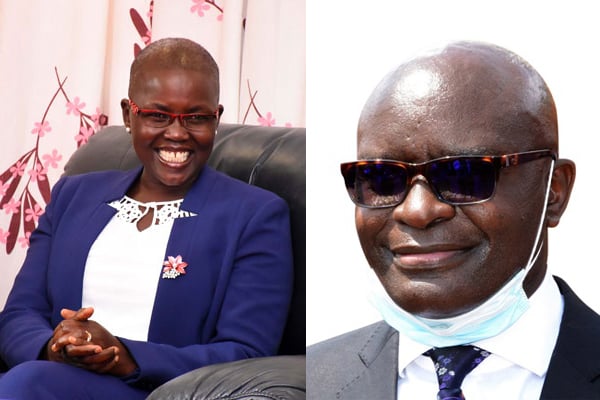EC's Byabakama, DPP Abodo must resign as judges- Court

DPP Justice Jane Frances Abodo and Electoral Commission Chairperson Justice Simon Byabakama
What you need to know:
- According to a panel of five Justices led by Justice Kenneth Kakuru, if a judge accepts to carry on duties assigned to Executive and Constitutional offices by the appointing authority, their actions under those offices shall be invalid if they don't resign
- The judgment arises from a successful petition filed by the recently deceased lawyer Bob Kasango in 2016
The Constitutional Court has unanimously ruled against the appointment of a Judicial Officer to any Executive or Constitutional office prior to his or her resignation from the Judiciary.
According to a panel of five Justices led by Justice Kenneth Kakuru, if a judge accepts to carry on duties assigned to Executive and Constitutional offices by the appointing authority, their actions under those offices shall be invalid if they don't resign.
This is because such actions contravene a number of articles enshrined under the Constitution especially regarding their mandates as the judicial officers and the oath they take.
This decision as it stands from now, according to the Spokesperson of the Judiciary, Mr Jameson Karemani, means that the duties performed before by judges in executive positions such as sanctioning of charges by the DPP Justice Jane Frances Abodo, presiding over the recently concluded elections by Electoral Commission Chairperson Justice Simon Byabakama and the actions performed by a judge under the Inspectorate of Government remain valid.
However, if they do not resign following this judgment, their actions will be illegal.
“The judgment means that the actions which have already been taken by the said judges still stand but moving forward, their actions after this judgment will be rendered illegal unless they resign as judges and are re-appointed to those offices,” Mr Karemani said.
The Judgment arises from a successful petition filed by the recently deceased lawyer Bob Kasango in 2016.
Kasango following his prosecution on the corruption charges sanctioned by the Director of Public Prosecutions Justice Mike Chibita in 2015, filed this petition a year later.
He noted that Justice Chibita continued to be a member of the Executive and its Chief Prosecutor and Criminal Litigator. He also noted that this position requires him to be the representative and advocate of the interests of the Executive in criminal disputes between the State and its citizens or other individuals or entities.
As such, Kasango argued that the said two roles are in clear conflict and the second one is something no Judge who upholds and honors the judicial oath should ever do in any Constitutional Government Democracy.
Accordingly, Kasango asked the court to declare the appointment of DPP while still holding serving as a judge as inconsistent with the constitutional and therefore declare all his actions in that office illegal.
But during the hearing of this case, the government through its Attorneys led by Christine Kahwa argued that in the event court finds that the actions of a holding judge to be a DPP, his or her actions done before this judgment shouldn’t be declared illegal as it would create an absurdity.
But in their judgment dated March 18 2021, the Justices led by Kenneth Kakuru have declared that the appointment of Chibita as the DPP while he was at the same time a substantive Judge of High Court of Uganda contravened the doctrine of separation of powers enshrined in chapters six, seven and eight of the constitution and articles 128(1-3), 129 and was therefore null and void.
Justice Kakuru who wrote the lead judgment stated that the Investigations, arrest and Prosecution of Kasango by the DPP when Chibita held office did not contravene any article of the constitution.
Other Justices on the panel are; Geoffrey Kiryabwire, Cheborion Barishaki, Stephen Musota and Muzamiru Kibeedi Mutangula.
According to the Justices there is nothing on record to show that Chibita resigned his appointment as a Judge of the High Court of Uganda before he took oath and assumed the office of the DPP.
"On the other hand sufficient evidence has been provided by the Respondent to show to the satisfaction of the court that he continued to be regarded by the Judiciary as a sitting Judge on special assignments" reads the judgment in part.
They add that the respondents who included the DPP and the Attorney General didn't bring to court any evidence of his resignation from his Judicial Office and from the head of the Public Service as well as the Judicial Service Commission.
"I therefore find that, Honorable Justice Mike Chibita did not first resign as a Judge of the High Court before his appointment to the office of the Director of Public Prosecution; his appointment as the DPP therefore was null and void and in contravention of article 223(4) of the Constitution”, wrote Justice Kakuru in the lead judgment.
He adds that although what Chibita did as DPP remains valid since they were done within the mandate of a DPP, it should be clear that henceforth, any further appointment of a Judge to any other executive or Constitutional office prior to his or her resignation would render his or her actions invalid on account that the law is now well settled.
Kakuru has also awarded the deceased Kasango costs for the reason that at the time when Chibita was appointed DPP on March 14, 2013, the Constitutional Court had already delivered a decision related to a case concerning the appointment of Justice Faith Mwondha as the IGG which was ignored by the appointing Authority who is President Yoweri Museveni.
Before taking leave, the court has observed that judges and justices are still being assigned and or appointed to various executive and constitutional offices.
As such, court ordered the relevant authorities, especially Judicial Service Commission to ensure that before a judge or justice takes up another appointment, he or she first resigns.


